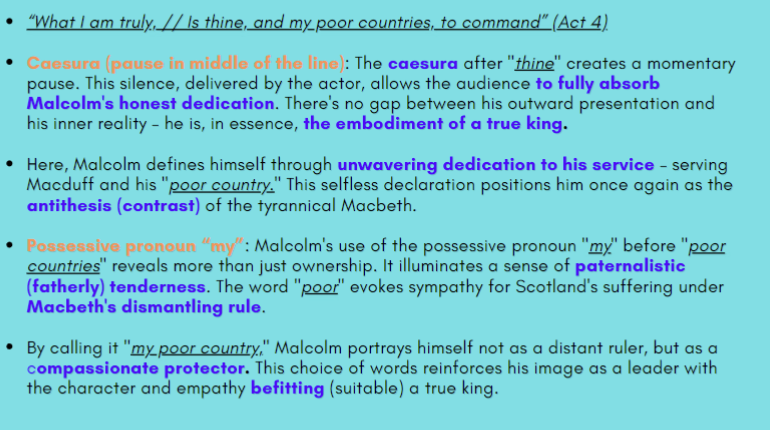Macbeth
1/68
There's no tags or description
Looks like no tags are added yet.
Name | Mastery | Learn | Test | Matching | Spaced |
|---|
No study sessions yet.
69 Terms
Describe and explain the context of James I
James I was a patron of Shakespeare’s company so the themes of Macbeth are catered to suit his interests (treason, supernatural, regicide)
James was also a staunch in DROK and GCOB
Banquo is of Scottish nobility as James I was and his presence in the play emphasises James's ancient royal lineage (showcasing his right to rule) - James believed he descended from Banquo which is probably why S showed B (ancestor) as so honourable
Describe and explain DROK
How does this link to the play?
DROK: Belief asserting a monarch derived their authority from God
Any attempt to expose or murder king is an attempt on God himself
God himself appoints a monarch and his will is passed down a royal family
Link to play: M violates DROK and suffers a gruelling death - his downfall is synonymous with guys violation of this → S’ portrayal of Duncan's murder as an act against God intended to appease KJ
Describe and explain the GCOB
How does this link to the play?
God created the world with a clear hierarchical structure encompassing all matter and life
Monarch held top seat of hierarchy
Men seen as higher on structure than woman →women expected to be subordinate to husbands
Considered fact of life
Link to play: When M kills KD he violated GCOB by betraying his superior and thus his God
Breaks GCOB by allowing his wife to emasculate him into regicide
Describe and explain Daemonologie
Published in 1597 by James I
Explores James's belief in magic and witchcraft aiming to prove the existence of such forces
Dictates punishments that should be administered for practising these
Link to play: In his book, James looks at ability of witches to control weather, potions, chanting → S’ depiction of witches mathches this
Describe and explain religion and the seven deadly sins
Jacobean society was highly religious
Seven deadly sins are a group of vices intended to prevent sin in Christian teachings and they were:
Pride,lust, gluttony,sloth,wrath,envy,greed,
Commuting any of these sins was considered to be straying from god
Link to play:
Each of the seven deadly sins can be found in the actions of key characters in the play
M is most guilty of pride, anger, envy and greed → death can be seen as punishment for this
D could be seen as gluttonous with his excessive banquets
Describe and explain the patriarchy
Social system in which men hold power and women face oppression from these men in power
GCOB dictates men are superior to women leading to a patriarchal social structure
Link to play:
S conforms to patriarchy but equally challenges it → country led by make monarch supported by male subjects but LM consistently subverts patriarchal expectations of women → exterior doesn't match interior
LM struggles against literary archetypal role and role in a society as a women and gets very punished for this
What is the key context of Macbeth?
(King Duncan’s Grim Death Sparks Paranoia)
King James
Daemonologie
GCOB
DROK
Seven deadly sins
Patriarchy
What are ten key words for Macbeth
(THUDMITCHV)
Tragic hero
Hamartia
Unchecked (ambition)
Duplicitousness
Motif of sleep/blood
Irresistible allure
Tyrannical
Carcass of insanity
Hubris
Violating divine order/law
What are the key themes within Macbeth?
(VAGGAS)
Violence
Ambition
Gender
Guilt
Ambition
Supernatural
What are some general shakespeares intentions?
Shakespeare utilises ambition as a central theme to underpin the play revealing its morally corrosive and blinding influence on individuals driven by self fulfilling and egocentric aspirations.
As King James I was a patron to his plays, Shakespeare uses the play as a veiled allegory. He intertwines the act of regicide with tormenting guilt, a potent reminder of the potential consequences for those who disrupt the divinely ordained order
Shakespeare cautions the audience about the perilous consequences of succumbing to the irresistible allure of supernatural powers, emphasising that such engagement with this dark force inevitably results in a rapid and catastrophic demise
“Vaulting ambition which o’erleaps itself and falls on th’other“
-Act one
- personification: M personifies his ambition alike to a human force that can corrupt his formerly innocent mind
-”fall” : shows M awareness that his all encompassing ambition is destined to lead to his physical and mental decline. Alternately, this portrayal positions M as a victim ensnared by his own ambition, showcasing his introspective understanding of its fatal consequences and presenting him as vulnerable to its relentless influence
-Metaphor: Metaphorical portrayal of M “vaulting ambition” draws a parallel between him and a jockey who is to manage an untamable almost animalistic force → not only depicts M struggle to control his ambitious nature but also suggests self-deception - M believes he is able to harness some control over his ambition enough that he is able to transcend the social, political and divine limitations placed upon him
“With Tarquina ravishing strides, towards his design”
-Act two
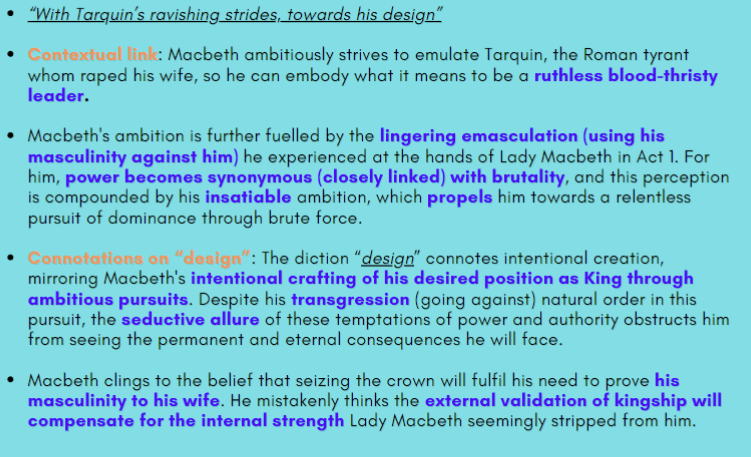
What are some key ideas about ambition?
Ambition is the hamartia of both M and LM. Their relentless pursuit of desires fuelled by an insatiable ambition becomes the catalyst for their inevitable mental and physical collapse, ultimately culminating in their tragic downfall
Ambition is the driving force behinf tragedy in the play. M is constructed as the tragic hero who undergoes a fall from grace as a result of his overindulgence in ambition
Ambition decieves individuals into having the illusion that they can transcend social, political and divine constraints. However, this deceptive allure inevitably collides with the harsh realities of existence and the destiny set out for them by God
Ambition will mentally rot the faculties of your mind whilst making you believe you're infallible - it obstructs individuals from seeing their true ephemeral nature
What are Shakespeare’s intentions with ambition?
Shakespeare utilises ambition as a central theme to underpin the play revealing its morally corrosive and blinding influence on individuals driven by self fulfilling and egocentric aspirations
Through ambition, Shakespeare allows his audience to examine the inherent flaws and capriciousness of human nature. illuminates how ambition, when in the wrong mind can readily justify the belligerent pursuit of power, status and violence
Through his allegorical play he aims to teach the audience that even in the presence of divine authority ambition can be so omnipotent it triumphs. He cautions his audience about succumbing to the seductive allure of sinful temptations, warning how this will lead to a life permanently separated from God and once united with the devil.
“Make thick my blood, stop up th’ access and passage to remorse”
Act one
Lady Macbeth
-Imperatives: The imperative “make thick my blood” illustrates how LM commands for emotional restraint and a callous indifference. Recognising that her aspirations for tyranny require a detachment from femininity and the accompanying emotions, LM seeks to rid herself of these elements to pave the way for her ruthless ambition
-Femme fatale: This is a seductive and manipulative woman who can lure men into danger or sin - it is a common trope within literature and poetry. She is thus a femme fake as she is not only manipulative, but rejects her womanhood and motherhood - a typical trope of a femme fatale
“A little water clears us of this dead”
Act 2
Lady Macbeth
-Litotes (under exaggeration) : LM omnipotent ambitions blind her to the profound mental torment M is experiencing
-Her callousness becomes apparent as she employs litotes such as the understatement “a little” not only to trivialise the act of murder but also to emasculate M, encouraging him further along his murderous path
- Euphemism to characterise regicide as a mere “deed“ highlighting a paradoxical aspect of her character. Despite her ambitions to shed her feminine traits and embrace tyrannical brutality, and struggles to articulate the gravity of the heinous act
-This foreshadows her descent into a melodramatic state of it insanity in A5 where she grapples with an inability to fully grasp the enormity of the sins commited
“Royalty of nature”
Act three
Macbeth (about Banquo)
-Imagery on “royakty “ : the portrayal of royalty conjures an image of divine ordination signalling M’s acknowledgement of B’s moral stature and respectability, akin to one chosen by God
-Foil: B serves as a foil to M, epitomising an ideal balance between ambition and respectability →as M descends from being “worthy” to a “hell-hound” he juxtaposes sharply with an ability to retain both ambition and piety
“He hath wisdom that doth guide his valour to act in safety”
Act 3
Macbeth (about Banquo)
-7 deadly sins: M epitomises the sin of envy as he desires for B’s capacity in tempering ambition and abstaining from succumbing to these “deep desires”
-Diction and connotation: The diction of term “guide” connotes leadership revealing M’s initial attempt to direct and lead his ambition. However, he succumbs to it's potent influence, rendering him vulnerable. In stark contrast, Banquo emerges as a figure capable of assured self guidance, steering clear of the temptations of sin
The ambivalent portrayal of Banquo stands as the antithesis to M bloodthirsty depiction, underscoring the contrast in their responses to ambitions compelling force
“I have no words; my voice is my sword”
Macduff, Act 5
Violent metaphor - I employing a violent metaphor, Macduff contends that the restoration of scotland’s natural order necessitates physical violence - his ambition is to rightfully restore Scotland. Thus, the initial upheaval brought about by Macbeth’s violent tyrannical means mandates a similar force to rectify the natural order which has been disrupted.
Macduff is the archetype of the avenging hero - motivated by revenge. Despite his personal motivations rooted in revenge, the nobility of his intentions shines through. His ambitious pursuits of dismantling macbeth single handedly to restore order is materialising into a reality.
Short sentences reflect the short time Scotland will be left to suffer - by slewing Macbeth, Scotland can be rightly governed and flourish under divine ordain
“Turn hell-hound, turn”
Macduff, Act 5
Repetition of “turn” symbolises Macbeth’s upheaval of order through his tyrannical rule. Conversely, it also highlights the palpable nature of Macduff’s ambition and aspirations to reinstate order in Scotland. Once Macbeth “turns” to face Macduff, Macduff knows he will be able to defeat him
Epithet “hell-hound” - the infernal imagery evoked by the epithet accentuates macduff’s condemnation of Macbeth’s diabolical ambitions and the ensuing turmoil
Macbeth stands in stark contrast once more as the antithesis to Macbeth. Whilst Macbeth prioritises his own selfish ambitions and desires, Macduff places his country and the people that reside in it at the forefront of his concerns
“A good and virtuous nature may recoil // in an inmperial charge”
Malcolm says to Macduff in act 5
Diction of “recoil” , Malcolm’s statement bertrays a deep understanding of human nature. The diction of “recoil” illuminates he recognises the seductive nature of power and the risk of moral compromise, even for the well intentioned
The subtle admission underscores Malcolm’s wisdom - he recognises that true leadership requires not just good intentions but the strength but also the strength to confront the potential compromises which power demands.
The enjambment after “recoil” makes the line bleed into the next, this physically representing how quickly those of a “good and virtuous nature” can be seduced by the allure of “imperial charge” and power
Malcolm is shrewd and wise as he understands the complexities of human nature - how even those divinely ordained - like himself - can be swayed by the satanic temptation of power - here, Malcolm acknowledges the fragility of faith in the face of immense ambition
“What I am truly, // is thine and my poor countries to command”
Malcolm, Act 4
Caesura after “thine” creates a momentary pause. This silence, delivered by the actor, allows the audience to fully absorb Malcolm’s honest dedication and ambition to be the best king for his people, there is no gap between his outward presentation and inner reality, he is in essence the embodiment of a true king
Here Malcolm defines himself through unwavering dedication to his service - serving Macduff and his “poor country”. This selfless declaration positions himself once again as the antithesis of the tyrannical ambitions of Macbeth
Possessive pronoun “my” - Macolms use of “my” before “poor country” suggests more than just ownership, it illuminates a sense of paternalistic tenderness. The word “poor“ evokes sympathy for Scotland’s suffering under Macbeth’s dismantling rule
By referring to Scotland as “my poor country”, Maloclm potrays himself not as a distant ruler but as a compassionate protector. This lexical choice reinforces his image as a leader with the character and empathy befitting a true king
Guilt key ideas
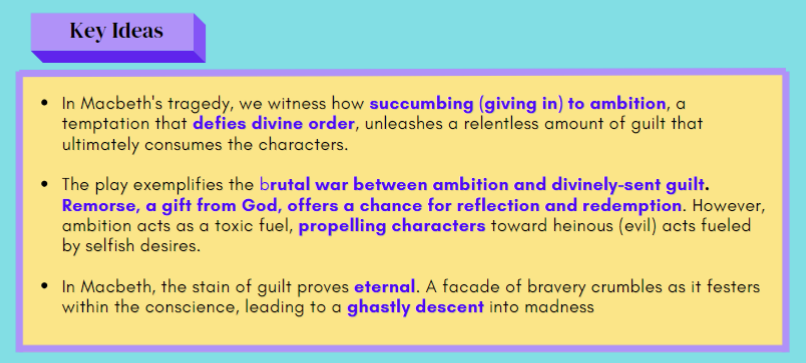
Shakespeare’s intentions with theme of guilt
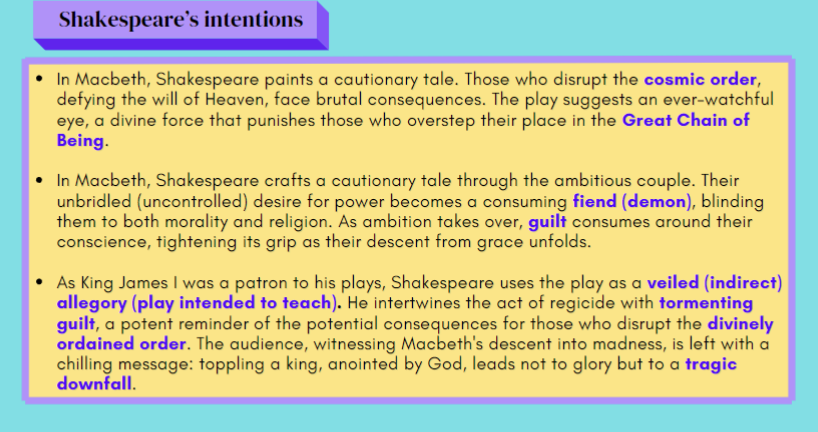
Who’s that critic guy and what does he say about guilt?

“I heard a voice cry ‘sleep no more! Macbeth does murder sleep”
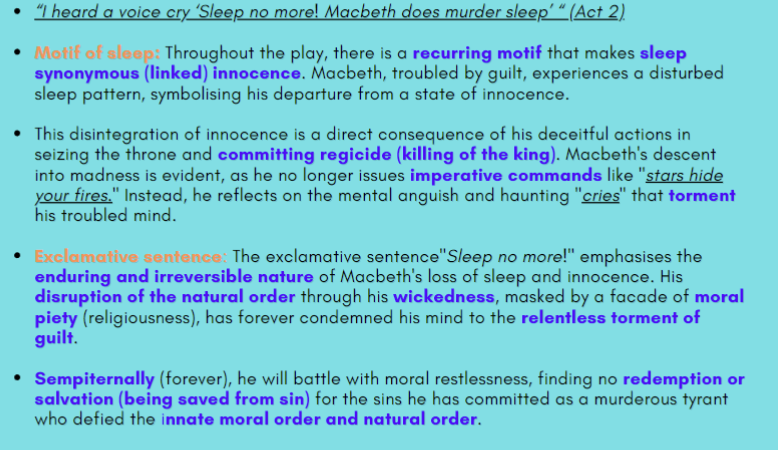
“I am in blood stepp’d so far that should I wade no more”
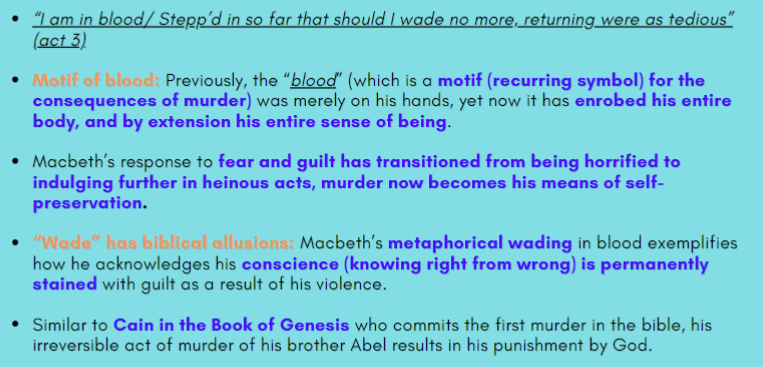
Who is that critic and what does he say about Lady Macbeth and guilt?

[Enters with a taper]
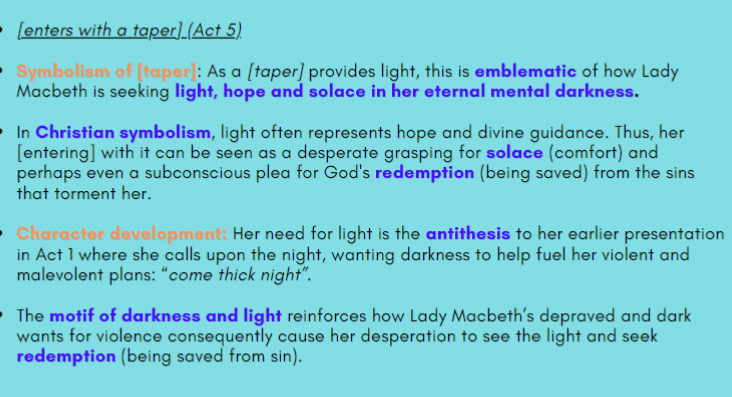
How to link Banuo to guilt

“I dream’d of the three weird sisters last night”
“I think not of them”
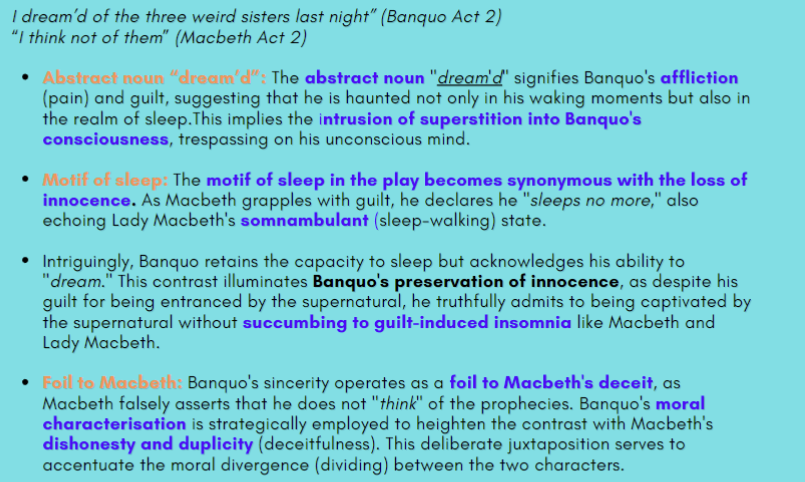
The supernatural - key ideas
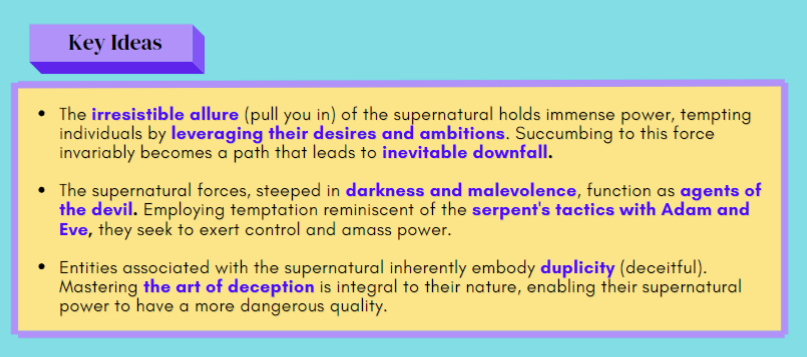
The supernatural - Shakespeare’s intentions
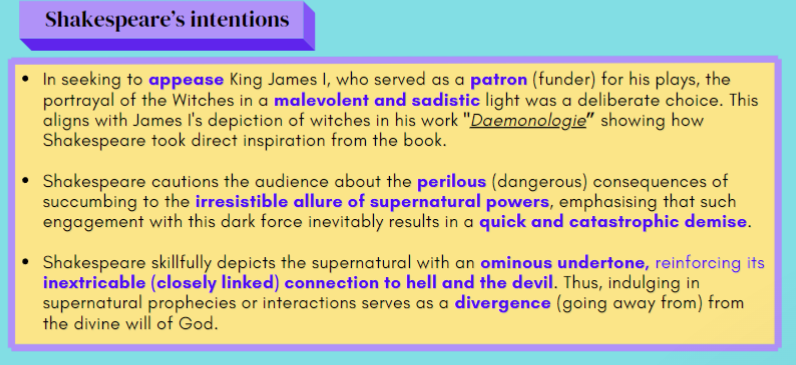
“So foul and fair a day I have not seen”
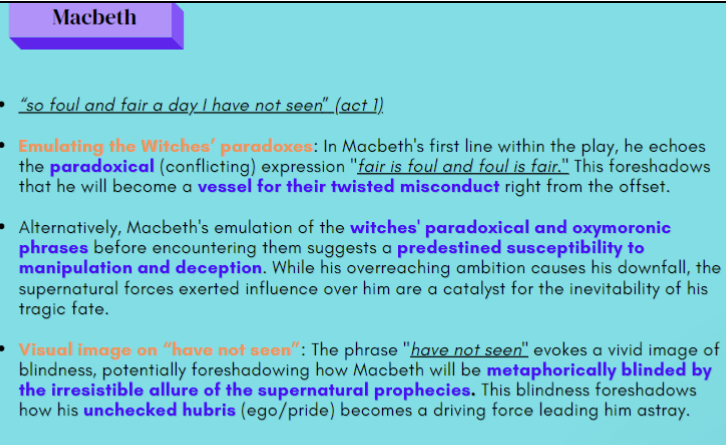
“Tell me” “Call em"
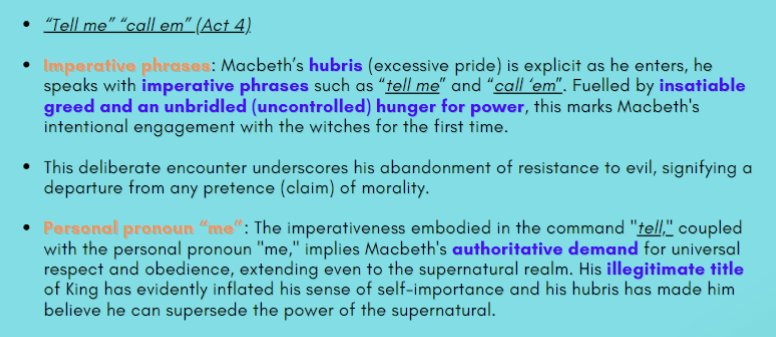
“Come you spirits…unsex me hear” “pour mine spirits”
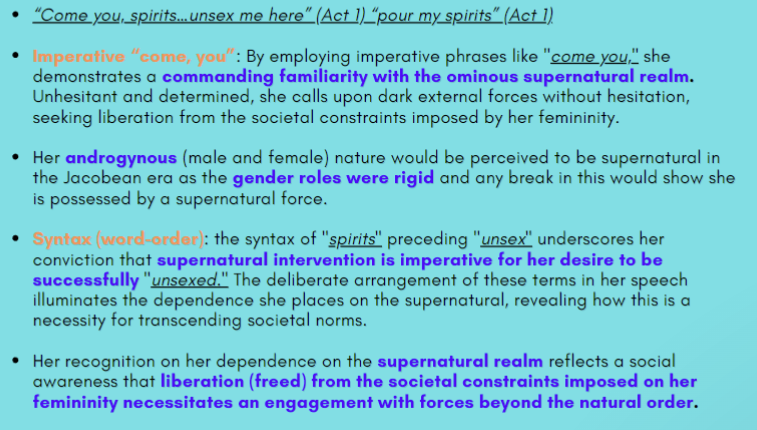
“Look like th’inoocent flower but be th’serpent under’t”
“All hail Macbeth, that shalt be king hereafter”
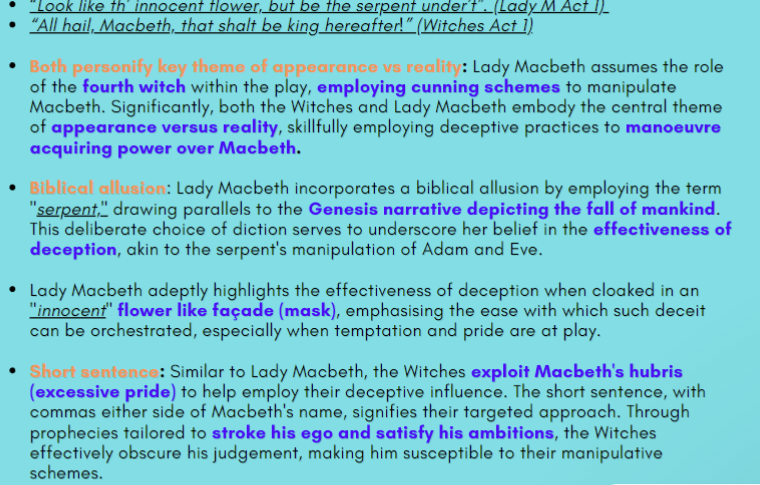
“Instruments of darkness”
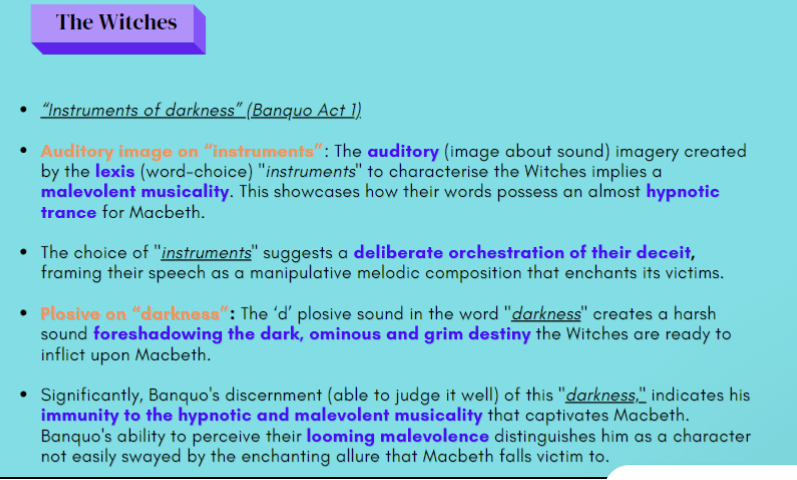
“Eye of newt”,”fire burn and cauldron bubble””hell broth”
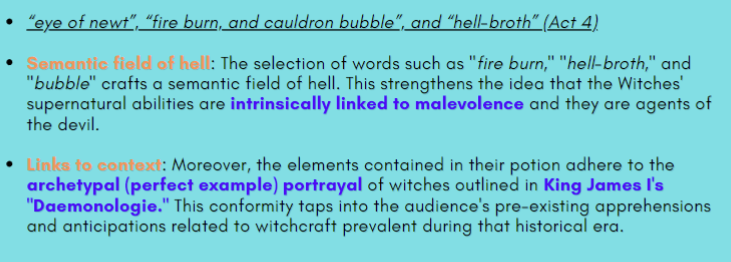
“Look not like th’inhabitants o’th’earth”
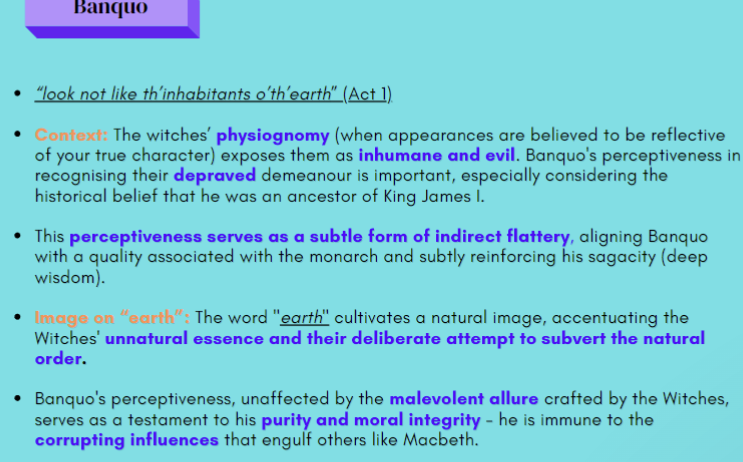
Gender - key ideas
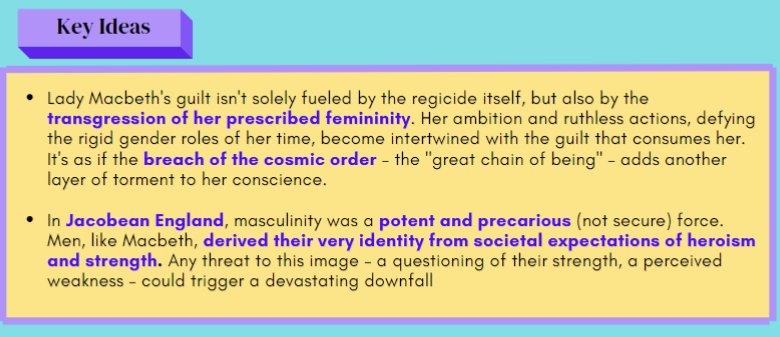
Gender - Shakespeare’s intentions
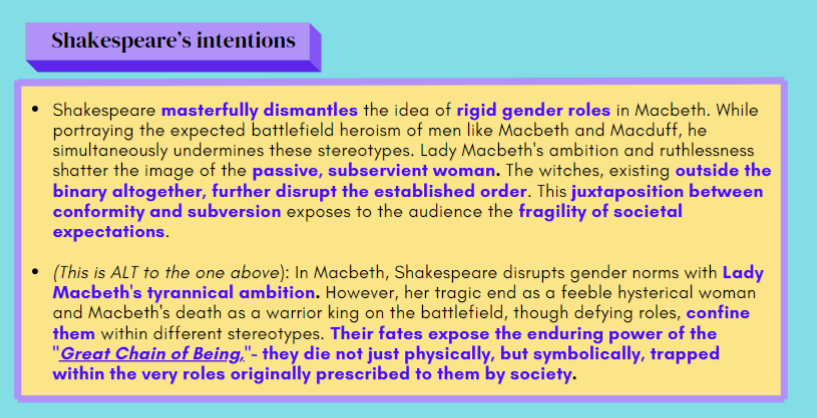
“worthy Cawdor!… all hail hereafter” → “coward”
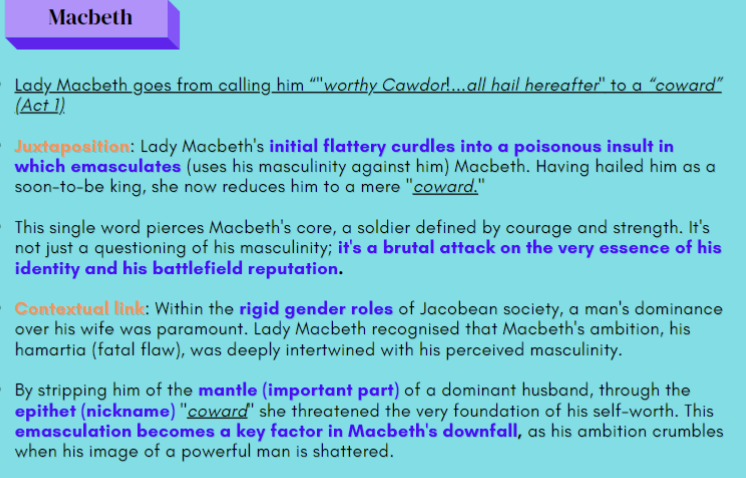
“Dash’d the brains out”
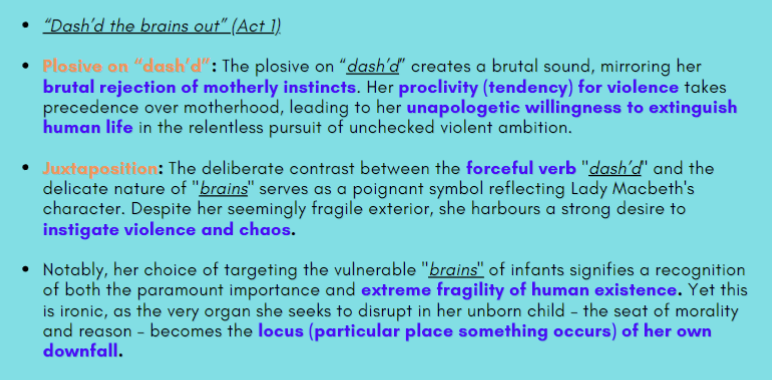
“Beards”
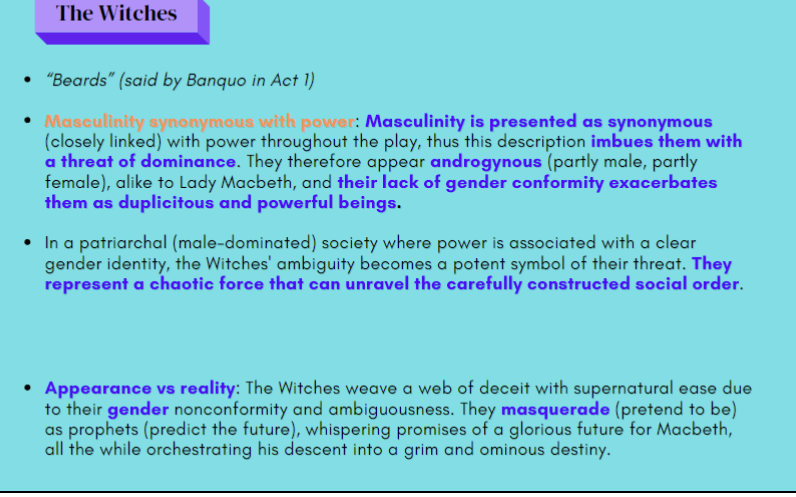
Violence - key ideas
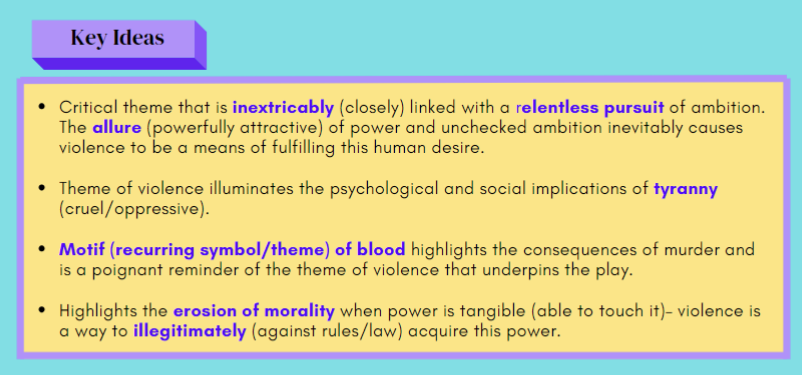
Violence - Shakespeare’s intentions
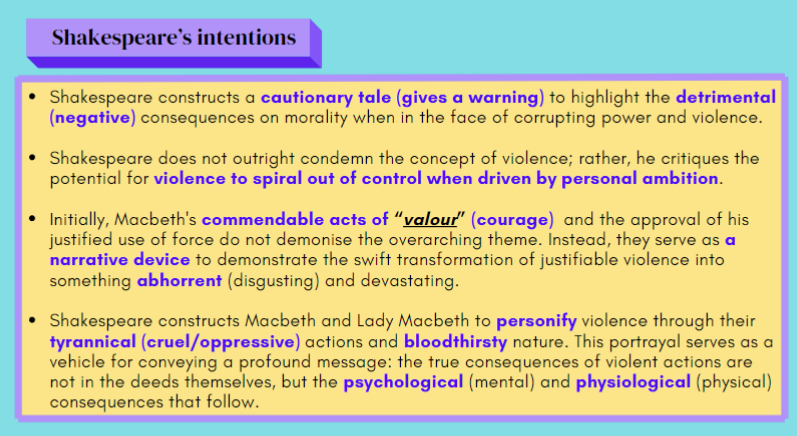
‘disdaining fortune…smoked with bloody execution’
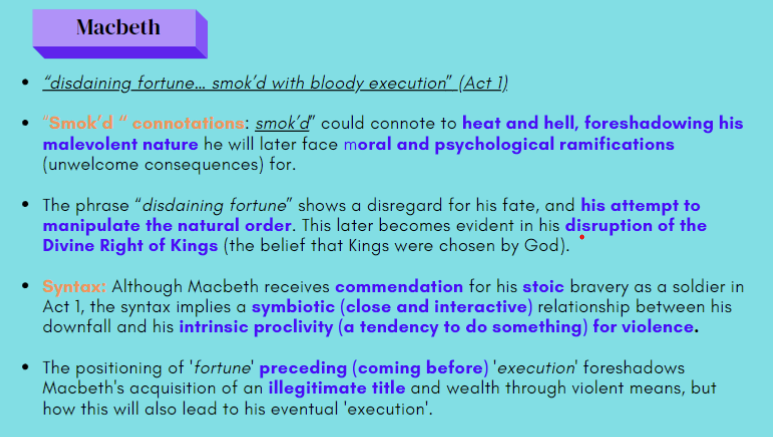
‘I am in blood / stepp’d in so far that should i wade no more, returning were as tedious’
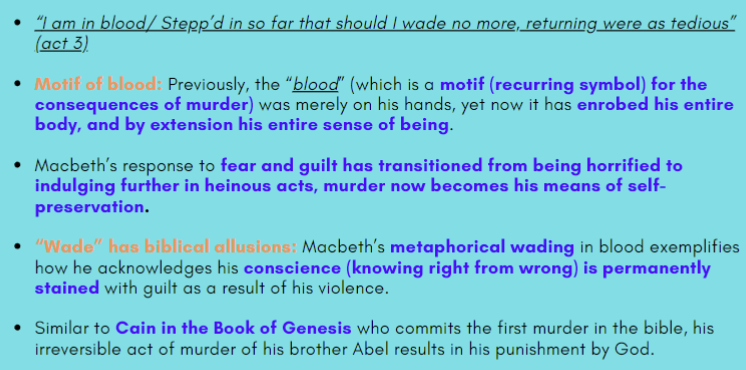
‘Dash’d the brains out’
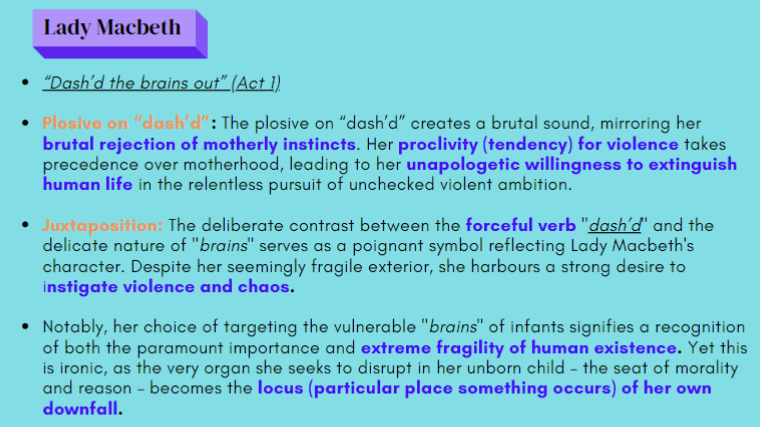
‘[Enters with a taper]’
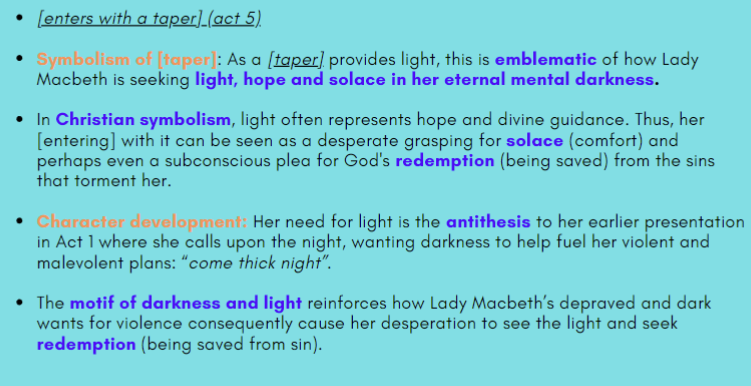
‘Bleed, bleed poor country’
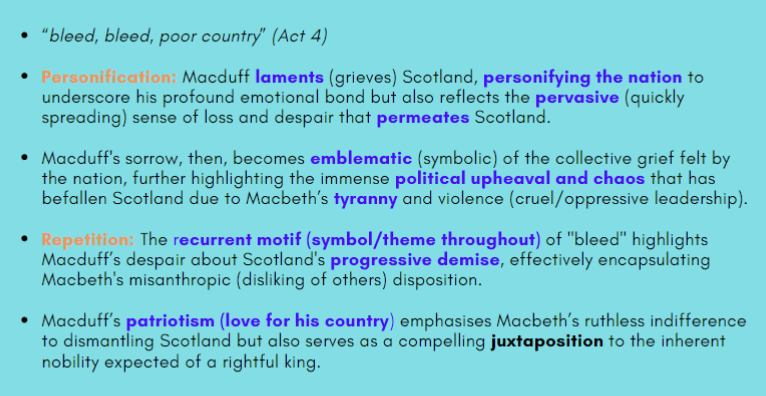
Appearance vs reality - key ideas
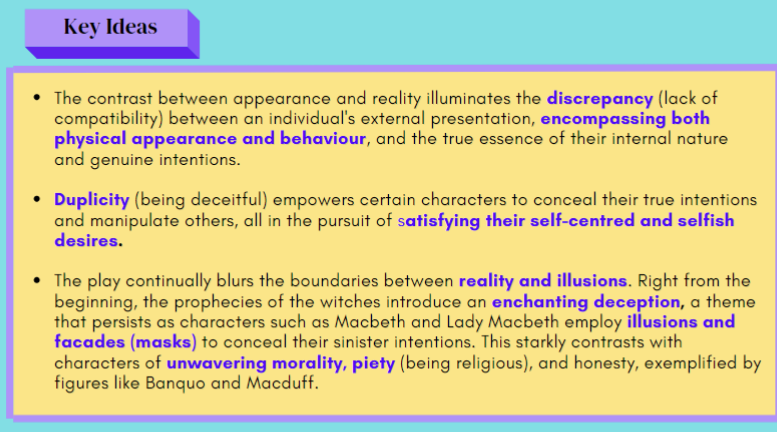
Appearance vs reality - Shakespeare’s intention
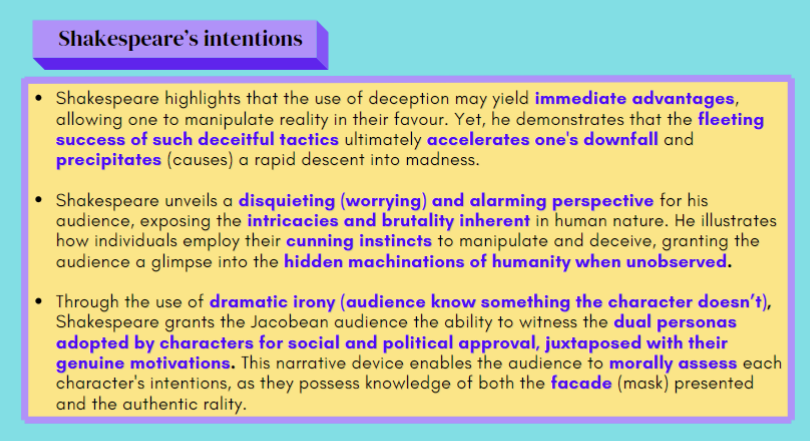
‘Stars hide your fires, let not light see my black and deep desires’
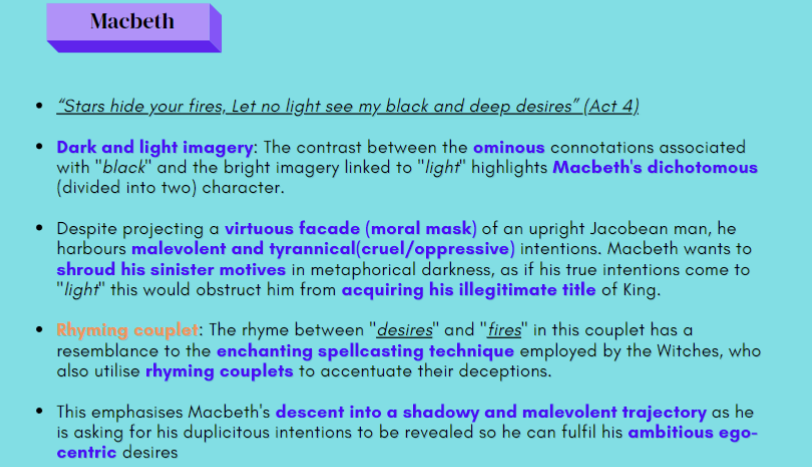
‘I heard a voice cry “sleep no more Macbeth does murder sleep”’
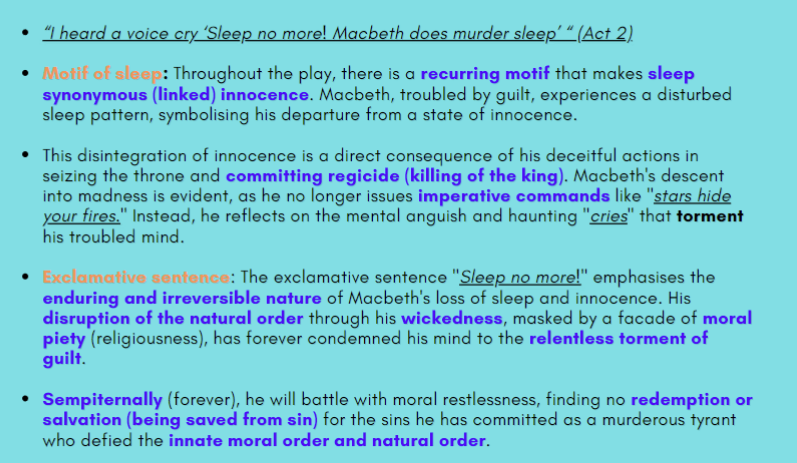
‘Look like th’innocent flower, but be the serpent under’t’
‘All hail Macbeth, that shalt be king thereafter’
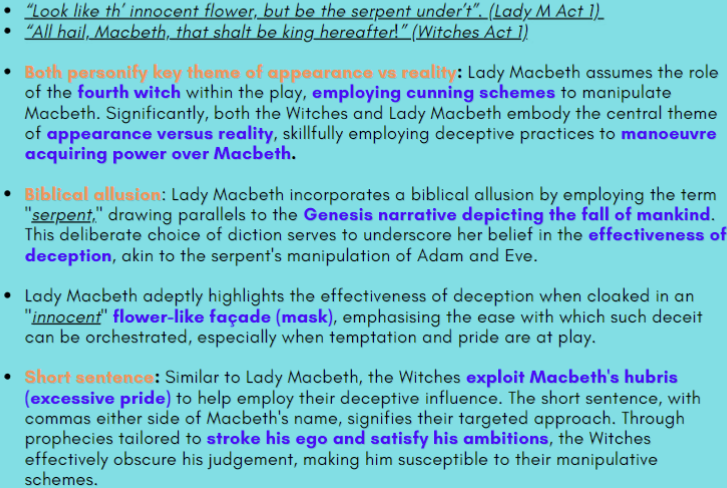
‘Fair is foul and foul is fair’
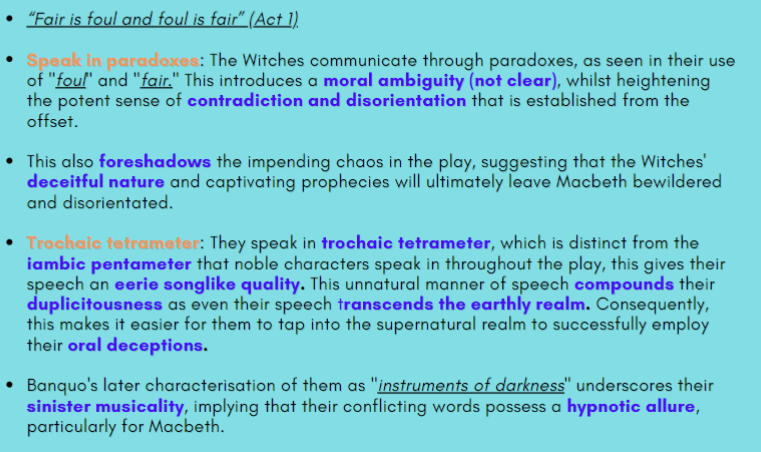
‘I dream’d of the three weird sisters last night’
‘I think not of them’
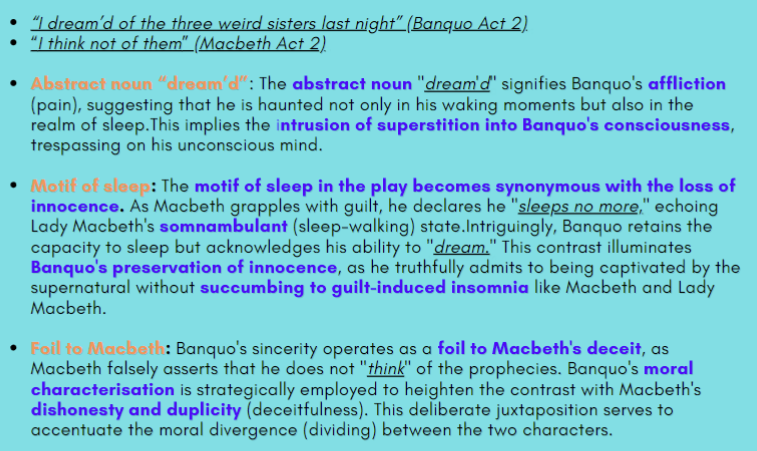
‘Most sacriligious murder hath broke ope the lords annointed temple’
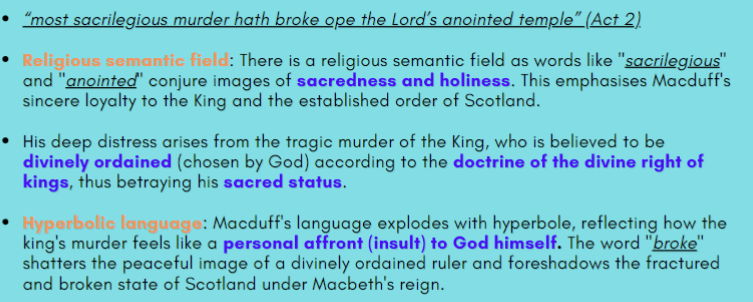
‘I am not treacherous
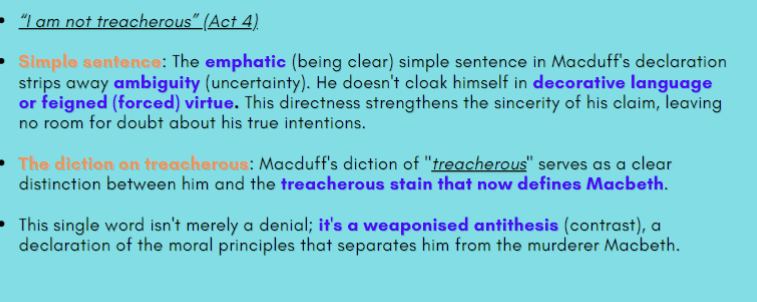
‘What I am truly, // is thine, and my poor countries, to command’
